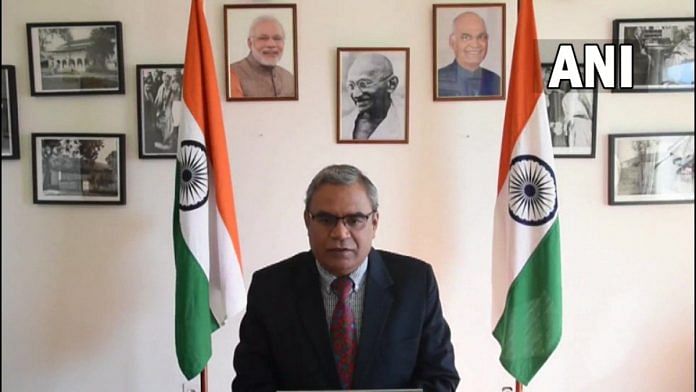New Delhi: India on Tuesday hoped that the situation in Afghanistan does not pose a challenge to its neighbours and the Afghan territory is not used by terrorist groups such as LeT and JeM to threaten other countries, as it pitched for an inclusive and broad-based dispensation in Kabul representing all sections of Afghan society.
In his address at a special session of the UN Human Rights Council on the situation in Afghanistan, Indian ambassador to the UN in Geneva Indra Mani Pandey said a “grave” humanitarian crisis is unfolding in the country and everyone is concerned about the increasing violations of fundamental rights of the Afghan people.
He said India hopes that the situation stabilises soon, and the parties concerned address the humanitarian and security issues.
“We also hope that there is an inclusive and broad-based dispensation which represents all sections of Afghan society. Voices of Afghan women, aspirations of Afghan children and the rights of minorities must be respected,” he said.
“A broad-based representation would help the arrangement gain more acceptability and legitimacy,” he added.
Pandey, India’s Permanent Representative to the UN in Geneva, said stability in Afghanistan is linked to the peace and security of the region.
“We hope that the situation in Afghanistan does not pose a challenge to its neighbours and its territory is not used by terrorist groups such as Lashkar-e-Taiba (LeT) and Jaish-e-Mohammed (JeM) , to threaten any other country,” he said.
There has been increasing concern in the security establishment in India about the possible security impact of developments in Afghanistan in Jammu and Kashmir as LeT and JeM have close links with the Taliban.
The ambassador said as a neighbour of Afghanistan, the situation prevailing there is of “great concern” to India.
“We are closely monitoring the rapidly evolving security situation in Afghanistan and we continue to call upon parties concerned to maintain law and order, ensure the safety and security of all Afghan nationals, UN personnel and diplomatic staff members, and observe human rights and international humanitarian law in all circumstances in Afghanistan,” he added.
The UN Human Rights Council has convened the special session to discuss the human rights concerns and situation in Afghanistan after Kabul fell to the Taliban.
“While the security situation remains precarious, a grave humanitarian crisis is unfolding. Everyone is concerned about the increasing violations of the fundamental rights of Afghan citizens. Afghans are worried about whether their right to live with dignity would be respected,” Pandey said.
He said the international community must extend full support to the people of Afghanistan.
“We, as the international community, must ensure full support to the people of Afghanistan in their desire for peace, stability and security in the country and to enable all Afghans, including women, children and minorities, to live in peace and dignity,” he said.
Pandey said thousands of people who have been internally displaced are facing an acute shortages of food, medical care and shelter.
“The basic rights of civilians, children and women including freedom of speech and opinion, access to education and medical care have been drastically hampered due to the ongoing situation,” he said, and called upon all the parties concerned to allow unhindered access to international assistance for all those who are in the need of it.
Pandey also referred to India’s significant contribution in recent years to the development of Afghanistan.
“India’s development partnership with Afghanistan rests on the five pillars: large infrastructure projects and connectivity; humanitarian assistance; human resource development and capacity building; and High Impact Community Development Projects (HICDP)s,” he said.
He said India has undertaken projects in critical areas of power, water supply, road connectivity, healthcare, education, agriculture and capacity building, noting that its emphasis has been on the welfare and well-being of the people of Afghanistan.
India’s development projects are in every one of the 34 provinces of Afghanistan and India has also extended humanitarian assistance of 75,000 MT of wheat to Afghanistan to strengthen food security during the COVID-19 pandemic, he added.
He said India’s “millennia-old” friendship with Afghanistan rests on the strong pillars of people to people relationships and that it has always stood for a peaceful, prosperous and progressive Afghanistan.
“India stands ready to assist our friends from Afghanistan in fulfilling their aspirations.. We hope that the situation stabilizes soon, and the parties concerned address the humanitarian and security issues,” he said.
Also read: India shouldn’t get militarily involved in Afghanistan, says ex-IAF chief Arup Raha






